
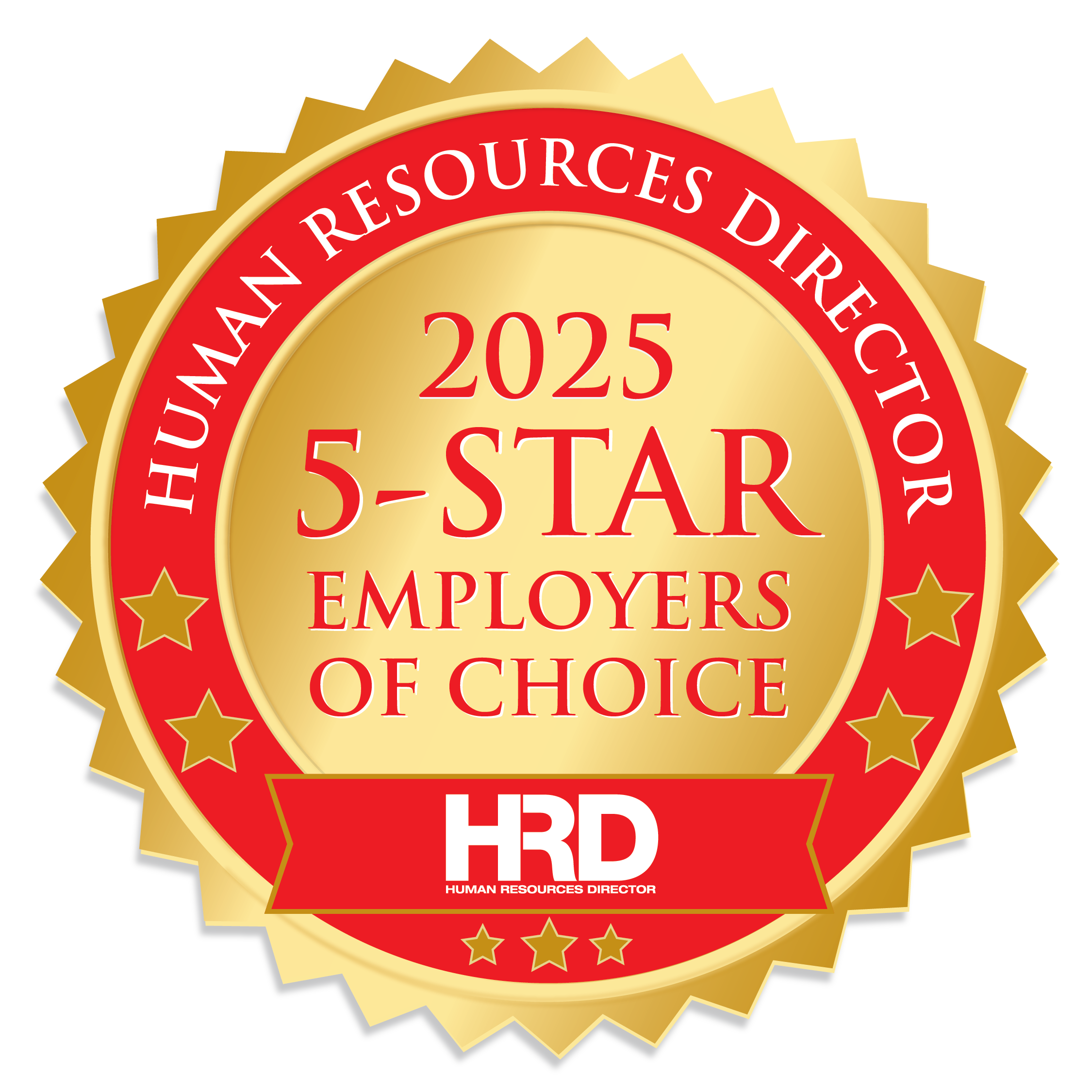
Jump to winners | Jump to methodology
Employees at companies of all sizes want the same things. That’s the message conveyed from Human Resources Director’s 2025 data, which shows the same six main priorities for staff in Australia and New Zealand, regardless of how big their employer is.
1. Flexible work options
2. Bonus/incentive programs
3. Generous paid leave allowance
4. Access to excellent technology
5. Employee reward and recognition programs
6. Family-friendly benefits (e.g., paid parental leave, carer’s leave, subsidized childcare)
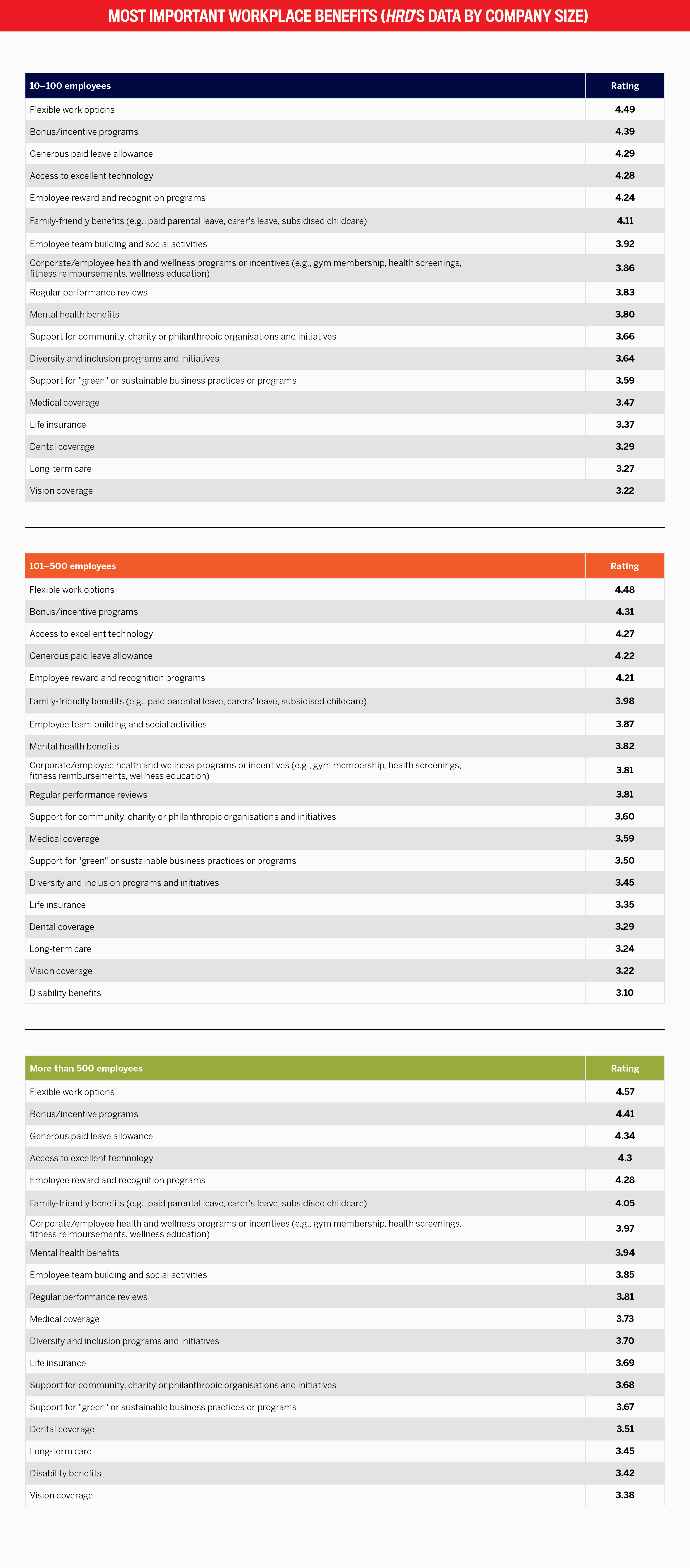
This is in sync with specialised recruiter Robert Half’s research, which states that the top three things Australian workers want to get from their job in 2025 are:
more money (62%)
flexible work hours (38%)
more benefits (36%)
“In the current economic climate characterised by high inflation and cost-of-living pressures, it’s no surprise that employees are prioritising financial security and comprehensive benefits packages,” says Nicole Gorton, director at Robert Half. “Cash has always been king, but it is especially so since flexible work hours, remote working options and professional development have become more commonplace as pay alternatives in the modern workplace.”
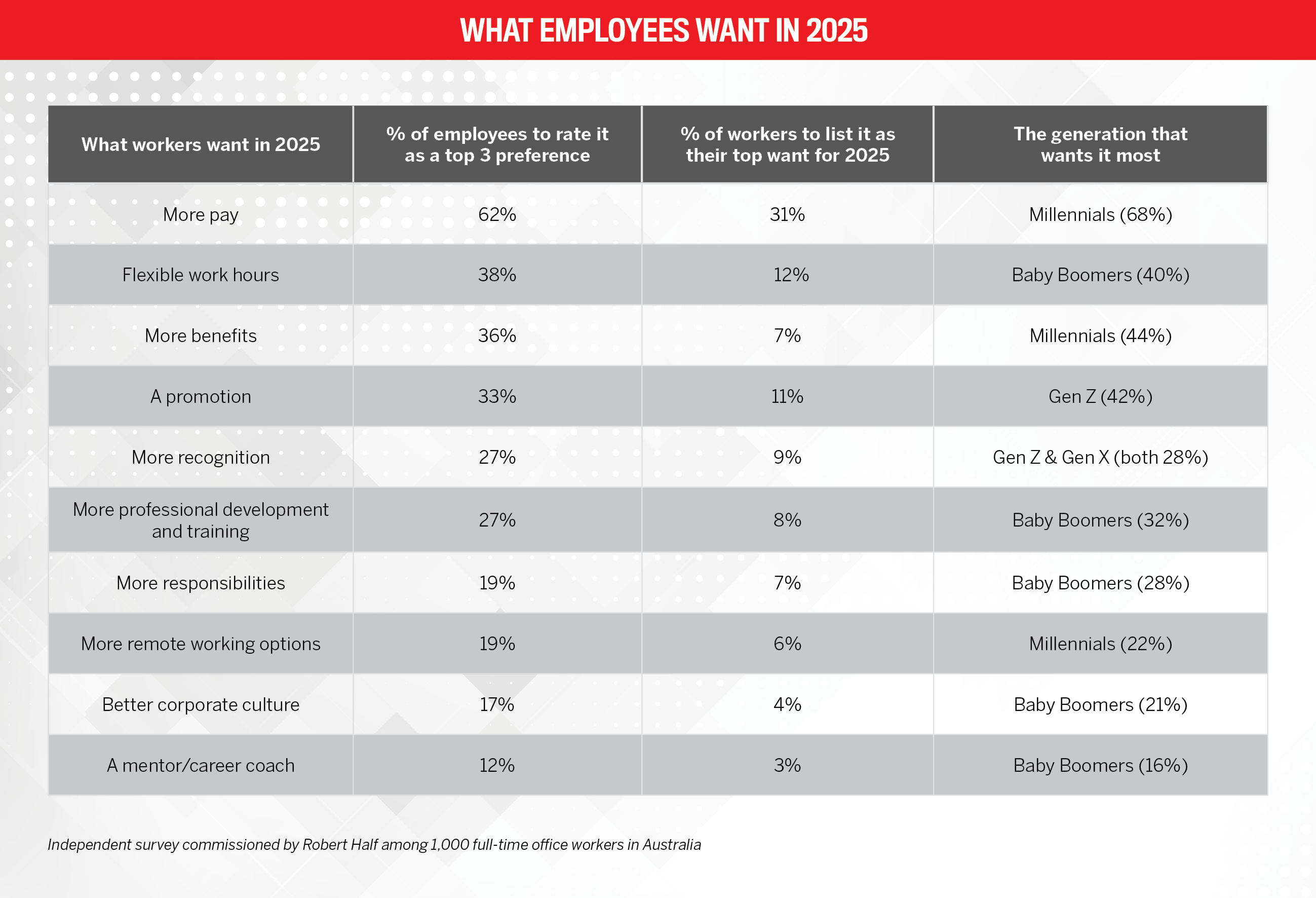
HRD’s data shows that most employees have found a hybrid situation that suits them and employers have also arrived at a balance that works. When respondents were asked to compare their current situation with what they would prefer, the large majority were already working in that way. The exception were 100% office-based employees, as only 55.11% prefer this, again underlining the importance of workplace flexibility.
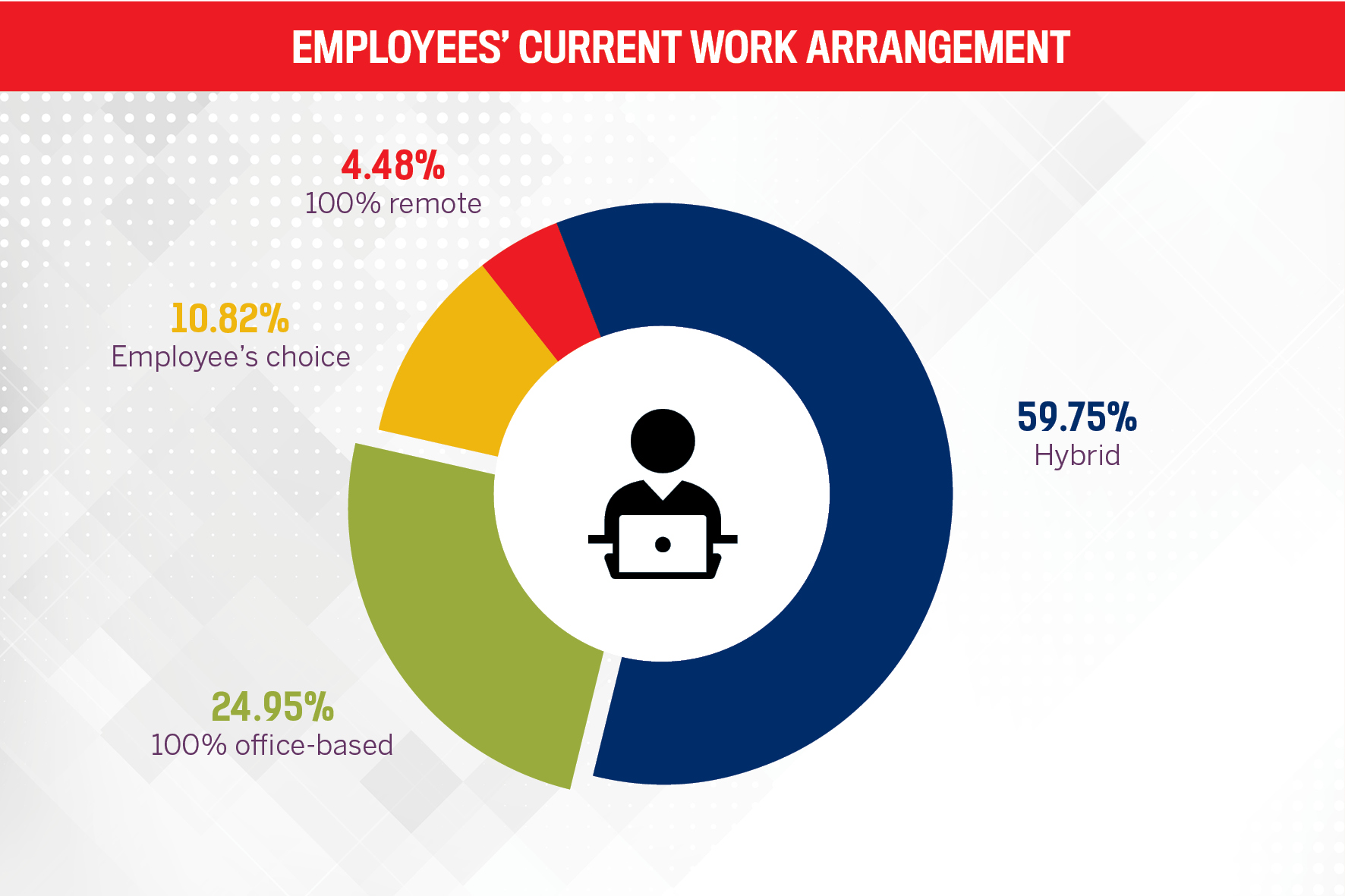
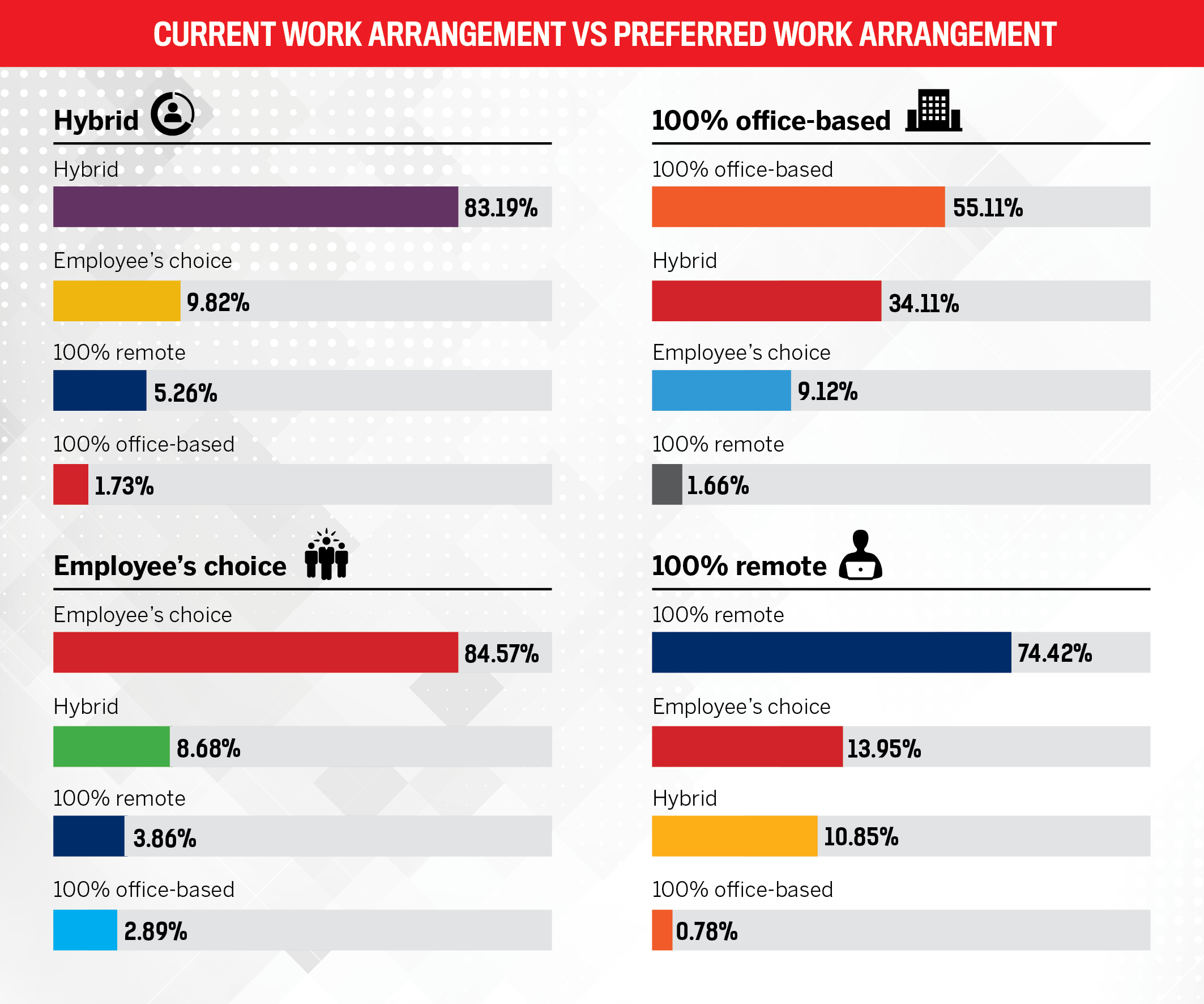
The process began with employers completing an in-depth submission of their various offerings and practices, and then employees from the nominated organisations filled out an anonymous form. The best nominees were awarded the prestigious distinction of 5-Star Employers of Choice 2025.
“In Australia and New Zealand, it’s clear that flexible working arrangements and training and development opportunities are standing out as the most impactful employee benefits in 2025,” says people2people recruitment agency’s chair, Mark Smith. “But just as critical, if not more so, is career growth as 58% of employees say they leave their roles due to a lack of career opportunities, making this the top reason people quit. Employers are addressing this by offering structured training and development as a core part of their employee experience.”
Smith also highlights that, according to people2people recruitment’s data, employee experience ranks as the number one priority for HR teams, yet 48% describe their departments as under-resourced, highlighting a significant capacity gap.
He says, “Today’s HR leaders must balance this challenge with rising expectations around flexibility, wellbeing, and inclusive policies. These teams are also expected to enhance employee experience while operating under budget constraints – especially as 61% of employers list budget pressure as the biggest influence on salary and bonus planning in 2025.”
Employees are seeking flexibility, benefits and recognition, which are the fundamental elements of an organisation’s culture.
Oyster Property Group (Auckland, New Zealand) 
Company size: 10–100 employees
The firm is focused on fostering a supportive, inclusive and dynamic environment.
Rebecca Dobby, head of people and culture, says, “We emphasise the importance of collaboration, innovation, and ethical behaviour, creating a culture where employees feel empowered to take ownership of their work, culture and push boundaries.”
Oyster Property Group’s core values are:
One Team
Courageous
Leaders
Ethical
The firm maintains a continuous connection with its team by conducting one-on-ones with managers, weekly or bi-weekly. There are also regular performance reviews quarterly and culture workshops to analyse survey results.

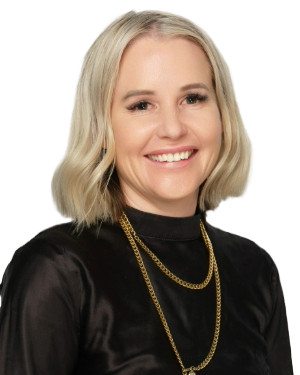
“We have a commitment to flexible work arrangements, equity, community engagement, and employee wellbeing through various perks, initiatives and benefits demonstrates our dedication to creating a fulfilling and balanced work experience,” says Dobby. “By prioritising the wellbeing and development of our people, we ensure that our team members can thrive and contribute to the company's success.”
Women account for 58% of Oyster’s employees and are working to have a bigger representation at the executive level.
Dobby adds, “We demonstrate our commitment to increasing women’s representation in leadership through targeted female promotion and succession planning, mentorship, and tracking progress towards female leadership goals in our board reporting. Metrics for 2024 showcase our commitment with 71% of promotions being women. Our goal is to achieve a 40:40:20 ratio across our organisation and leadership team.”
CreditorWatch (NSW, Australia) 
Company size: 10–100 employees
Four core values are the foundations behind the commercial credit agency’s culture:
People make the difference.
The one percenters add up.
Committed to growth
Dependable and trustworthy
“If we invest in our people, then they will grow with us. They will make us better in the process and are accountable for achieving our goals,” says chief people and culture officer Fiona Crawford. “We do the ‘little things’ that perhaps others don’t. We constantly push for better ways of doing things and to build and deliver a better product.”


Employees enjoy flexible start and end times, as well as hybrid work arrangements, to cater to diverse needs. For example, during Ramadan, observing employees are encouraged to flex their hours around fasting. There is also support for those who need temporary remote work to support personal or family situations.
Employees are encouraged to work in a hybrid model, typically spending two to three days per week in the office, and the remaining working from home.
Crawford explains, “We pride ourselves on transparency, accountability and alignment. Given the diverse and often complex nature of our organisation, sharing information across teams with agility is paramount for not only innovating but also responding to our customers’ needs. To do this, our business has adopted a flat and informal structure to ensure that people know where to go, who to ask, and not be afraid to ask questions.”
TPG Telecom (NSW, Australia) 
Company size: More than 500 employees
Fostering an inclusive culture and encouraging their people to be at their best is the mindset, along with a strong commitment to providing a flexible workplace, premised by understanding this means different things to different people.
The hybrid policy is up to three days per week flexible and two days in the office. To perform their roles flexibly, employees are provided with the technology and tools including laptops, tools-of-trade devices, as well as free mobile and home internet plans.
Other flexible initiatives are:
Summer Fridays, corporate employees finish at 2 pm to rest and recharge
A dedicated Summer Day, an additional paid day off, for frontline staff
Four days of Your Leave annually, in addition to government legislated annual leave
Career break leave options allowing three- or six-month breaks over three years
Paid study leave for company-approved course of study
Opportunity to purchase up to two weeks additional leave annually
TPG Telecom recognises that employees may have additional flexibility requirements, so they can submit requests to temporarily or permanently relocate to another state office or temporarily work overseas.
TPG Telecom also partnered with TelcoTogether Foundation to identify areas of collective action and responsibility within the industry that will have the greatest impact on reducing instances of domestic violence while also supporting survivors. Their Domestic Family Violence (DFV) action plan is aligned to the TelcoTogether Framework and supports both employees and customers.
In November 2024, as part of the 16 Days of Activism to end violence against women, all TPG Telecom employees, alongside employees from other Australian telcos, were encouraged to join the eSafety Commissioner’s webinar on tech abuse and equip themselves with information on the DFV intranet page. All employees even have access to 20 days paid DFV leave.
Kinetic (Auckland, New Zealand) 
Company size: Over 500 employees
Australasia’s biggest bus network aims to be more flexible and family friendly as part of its Women Up Front program, which has a 2030 goal of increasing the proportion of women to over 40% of the business.
The program was launched in New Zealand to actively target and encourage more women, as currently only 18% of females make up Kinetic’s overall driver population. One of the biggest barriers to women becoming bus drivers is consideration of the profession.
Managing director Calum Haslop says, “Redressing the gender imbalance in our workforce is about building a more sustainable commercial business long-term. We are taking decisive steps to create a more inclusive and equitable workplace and solidifying our status as the employer of choice in our industry.”
The program addresses barriers, such as not having a bus licence and paying participants from day one (providing job security and reliability), and enables women to train alongside other women in a supportive manner.
There is dedicated targeting of females who have people and customer service skills, as the program offers all the support and training necessary to become a fully licenced and confident bus driver.
“Our research shows that the key limitation to recruiting female drivers is simple – it’s often not considered at all,” adds Nicky Harrison, director of people, culture and safety. “This campaign aims to change that. We’re creating training and development opportunities, paying a market competitive wage – depending on region – and offering a variety of shift options.”
Village Roadshow Theme Parks (QLD, Australia) 
Company size: 101–500 employees
Over the past year, Village Roadshow’s divisional executive teams endorsed a DEI strategy, as the company focuses on achieving gender equality for women. As part of this, it reviewed the parental leave policy to consider any appropriate changes or updates.
An annual gender pay equity review was also undertaken, including analysis to monitor status and changes in pay gaps across the organisation, as well as across business divisions to ensure there is pay equity and no gender bias during remuneration reviews.

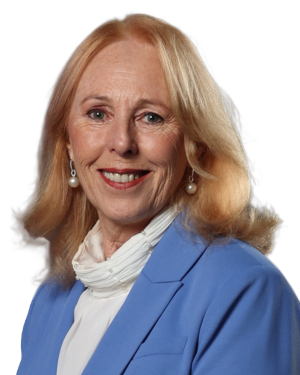
In addition, there has been effort to foster diversity via the public holiday clause, giving employees flexibility to substitute certain holidays to observe other cultural or religious days. An internal calendar has been developed to celebrate key DEI dates or moments and acknowledge cultural dates of significance, along with a program of events for employees to engage with and learn from focus communities.
Events covered include:
International Women’s Day
NAIDOC Week
Pride Month
Wear It Purple Day
A Taste of Harmony
Ann-Maree O’Neill, head of people and culture, says, “We have hundreds of training programs that our team members can access online and free of charge. We champion women and their role in the company and encourage them to participated in leadership training programs and to share their stories with other team members.”
Village Roadshow’s six-tier leadership program is available to supervisors, managers and senior managers, and its attendees are 50% women, resulting in strong career paths.
Being recognised and appreciated has a major impact on employee happiness.
Vitaco Health Group (Auckland, New Zealand) 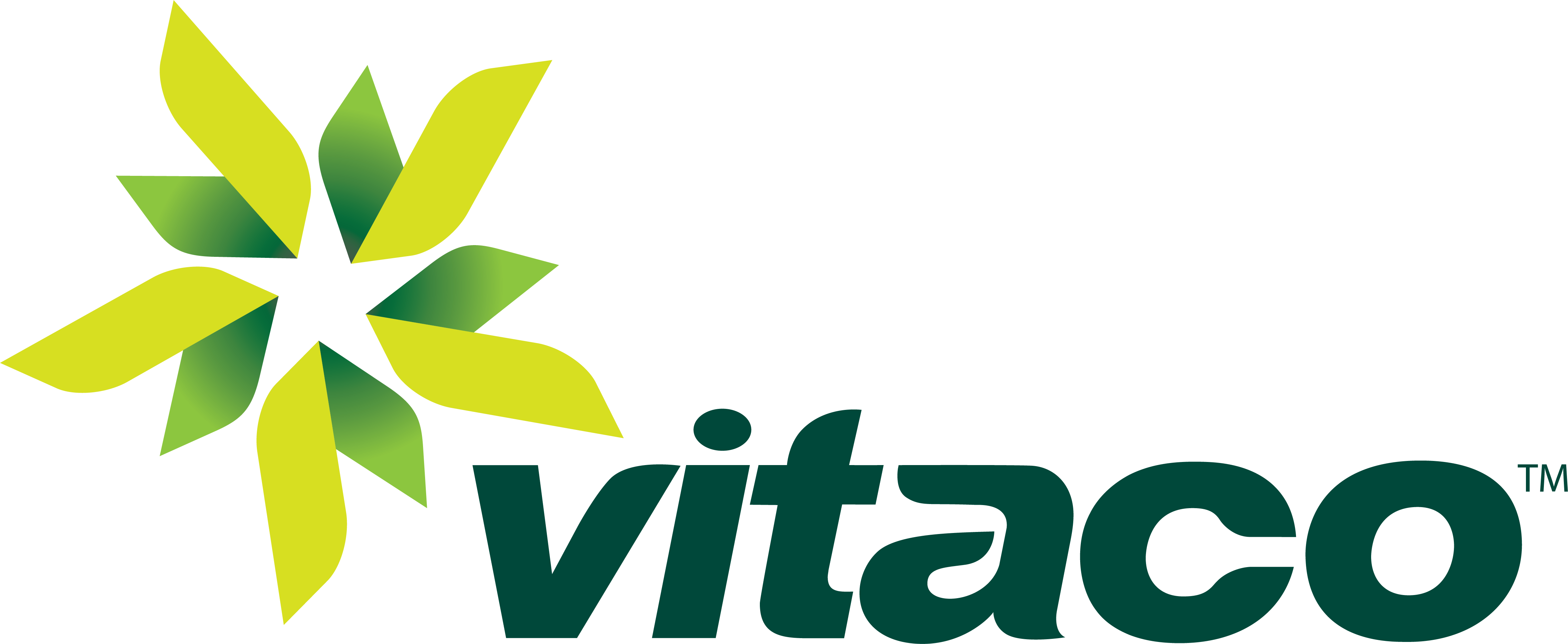
Company size: More than 500 employees
All waged team members at the firm, home to many of leading Australia and New Zealand’s health food, sports nutrition and supplements brands, are introduced to the firm’s Good Manufacturing Practices fundamentals through a rigorous induction and training program. Once the training is completed, the employees are supported to increase their knowledge and income by learning new end-to-end processes.
“As well as negotiated union increases, this provides a way for people to drive their income as well as establish career paths. We always advertise every role internally and there are countless examples of our people progressing their careers through Vitaco on both sides of the Tasman,” says Lucinda Warren, chief people and culture officer. “We see people moving sideways, into project secondments, between Australia and NZ, and into more senior roles.”
There are also a series of short-term incentive programs ranging from 10% to 25% of salary, which can be maximised up to 150%.

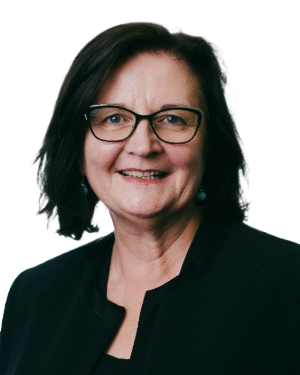
CreditorWatch (NSW, Australia) 
Company size: 101–500 employees
The firm has a range of diverse and innovative programs that recognise employees who go above and beyond:
Referral bonus: Employees who refer a new employee receive a $5,000 referral bonus upon successful completion of probation.
Bonus and commission payments: Employees are eligible for performance-based bonuses and commissions for achieving individual and/or team targets.
Employee awards: At the end of each month, outstanding employees are recognised for exemplifying the company’s core values during an all-staff event (Hoedown). Awards are given to those who have exemplified values throughout the month. Winners receive a gift card and a trophy.
Team celebration lunches: When teams meet or exceed their ‘stretch’ targets (Big Hairy Audacious Goals or BHAGs), they are treated to celebratory team lunches.
High performers’ trip: The company rewards top performers for the year with a fully paid group vacation.
Corporate box/tickets: Senior leaders can nominate outstanding performers from other departments to attend selected events at the company’s corporate box at Allianz stadium.
Liberty Financial (VIC, Australia)
Company size: More than 500 employees
As a sponsor of the women’s and men’s A Leagues, Essendon Football Club, Melbourne Renegades and the Hockey One League, Liberty Financial gets free tickets made available to staff.
There is also a fully subsidised KidsCo childcare program, available during school holidays to assist parents. This is backed up by parental leave (260 days), carer’s leave (10 days) and early childhood support leave. Employees can also take advantage of fertility support leave (five days), reproductive health leave (six days) and cultural leave (five days).
To help boost morale and foster connection, Liberty games and competitions are hosted, while the office breakout rooms have board games, consoles and arcade games to promote general wellbeing.
Mark Moran Group (NSW, Australia) 
Company size: 101–500 employees
Recognising the exceptional service delivered by employees across its three facilities is a priority for the person-centred aged care organisation.
Team members who are top performers receive gift cards. Although a small gesture, it serves to motivate and create a workplace environment where efforts are regularly acknowledged, contributing to an overall positive and rewarding atmosphere. Team members are offered a voucher on their birthday to spend on food and drinks at the in-house café.
“By celebrating birthdays in this way, Mark Moran Group fosters a culture of care and recognition, ensuring that employees feel valued and appreciated not just for their professional contributions but for their individuality as well,” says diversional therapist, Michael Murgolo.
To close out each year, all staff members are presented with Christmas gifts and a card as appreciation for their work and dedication. These gifts are chosen to reflect the company’s appreciation, alongside a Christmas party which provides free food, drink and transport to all employees.
Sydney Children’s Hospitals Foundation (NSW, Australia)
Company size: 101–500 employees
Employees’ autonomy is recognised by the Foundation’s “A Career Path You Create” scheme. Team members are encouraged and empowered to design their own career journeys, whether that means specialising further in their field, exploring new opportunities or developing their leadership potential.
Chief people and culture officer Mariam Hares says, “We understand that career progression looks different for everyone, and we are committed to fully supporting employees, whatever route they choose.”


SCHF provides each employee with Learning Dollars (valued at $1,500 per year) for training, certifications and skill development. They can also benefit from their Learning Leave, which allows dedicated time to focus on learning and development, demonstrating a commitment to fostering a growth-oriented workplace.
At SCHF, you don’t have to follow a ladder to grow. We back curiosity, courage and ambition – however they show up,” explains Hares. “Our people are passionate about purpose and impact. We make sure they’re equally supported in building the careers they want by giving them agency through flexibility and impact.”
While many initiatives for employees are easy to define, there is also an intangible element to ensuring a workplace is somewhere people enjoy. This is illustrated by employers introducing programs that engender a sense of spirit.
Oyster Property Group (Auckland, NZ) 
Company size: 10–100 employees
Belonging and inclusivity are prioritised so employees know that their contributions are recognised and appreciated.
“Our people should feel empowered and inspired, with the confidence to take initiative and innovate without fear of failure,” comments Dobby. “Additionally, we strive to create an environment where our people experience job satisfaction and fulfilment, finding purpose and meaning in their work. We prioritise wellbeing, ensuring that our team members feel balanced and cared for both professionally and personally.”
CreditorWatch (NSW, Australia) 
Company size: 101–500 employees
Crawford explains the rationale behind the range of emotions the firm wants to engender across its team.
Excitement: “We have a great product which our people believe in. They see its value in the market and what it can do to help Australian businesses.”
Pride: “Our mission is to be number one in our industry. Our people believe that our product is the best in the market and want to keep it that way and continue to be of value to our customers.”
Belonging: “We want people to feel like they are part of something here and that they can bring the best version of their own self to work. As we grow, we want our people to grow with us and to do so, we recognise that we are a diverse organisation and celebrate that at the same time.”
Achievement: “We set ambitious goals to achieve as an organisation, most of which are shared across departments.”
There is also the Coffee with Coghlan scheme, an informal CEO-led ‘ask me anything’ session where employees can anonymously submit questions and receive direct answers.
“This initiative fosters a culture of openness and gives staff insight into business decisions and performance updates,” adds Crawford.
TPG Telecom (NSW, Australia) 
Company size: More than 500 employees
The firm is dedicated to empowering every individual to play a pivotal role in building a society where disability inclusion is not just a goal but an integral part of success.
TPG Telecom is a member of the Australian Disability Network (ADN) and established its DNA (Disability Network Alliance), a dedicated group of employees passionate about accessibility in all its forms, either as people with lived experience of disability or as allies.
The vision is to create awareness, provide support and challenge bias and stigmas for its customers, people and community living with disability. TPG Telecom has pledged to continuously educate, adapt and advocate for a more inclusive future.
As part of this effort, the company offers workplace adjustments which are modifications to processes, practices, procedures or settings that enable a person with a disability to perform their job in a way that minimises the impact of any barriers.
What marks out the best employers is an ability to think outside the box and deliver something unique that brings their whole team together and creates positivity.
Oyster Property (Auckland, NZ) 
Company size: 10–100 employees
Currently, 17% of employees come from underrepresented groups and this is going to be a continued initiative, thanks to a collaboration with Auckland University to support Māori and Pasifika communities by:
Expanding and diversifying Oyster Property’s internship program with targeted and supportive measures to foster a more inclusive recruitment process for Māori and Pasifika candidates
Partnering with Māori and Pasifika university groups to raise awareness and impart knowledge about the property industry and potential career pathways
In addition, the company offers its team a Duvet Day.
Dobby says, “It’s not booked in advance, but if and when they feel like they need a day to rest and recover or for mental wellbeing. It’s based on a yearly allocation, and it’s use it or lose it.”
CreditorWatch (NSW, Australia) 
Company size: 101–500 employees
The firm runs hackathons, which are learning and development sessions within the technology teams. These events typically last two to three days, as teams build and then pitch ideas for products, such as anything from internal tools to new product features.
“It’s a chance for people to work with outside their usual teams and have some fun experimenting with new technology along the way,” says Crawford. “It helps build and maintain engagement within teams as they give people variety from their usual role and a chance to showcase their creativity. It also gives some of our more junior developers the chance to take the lead on projects.”
Carbiz Replacement Cars (NSW, Australia) 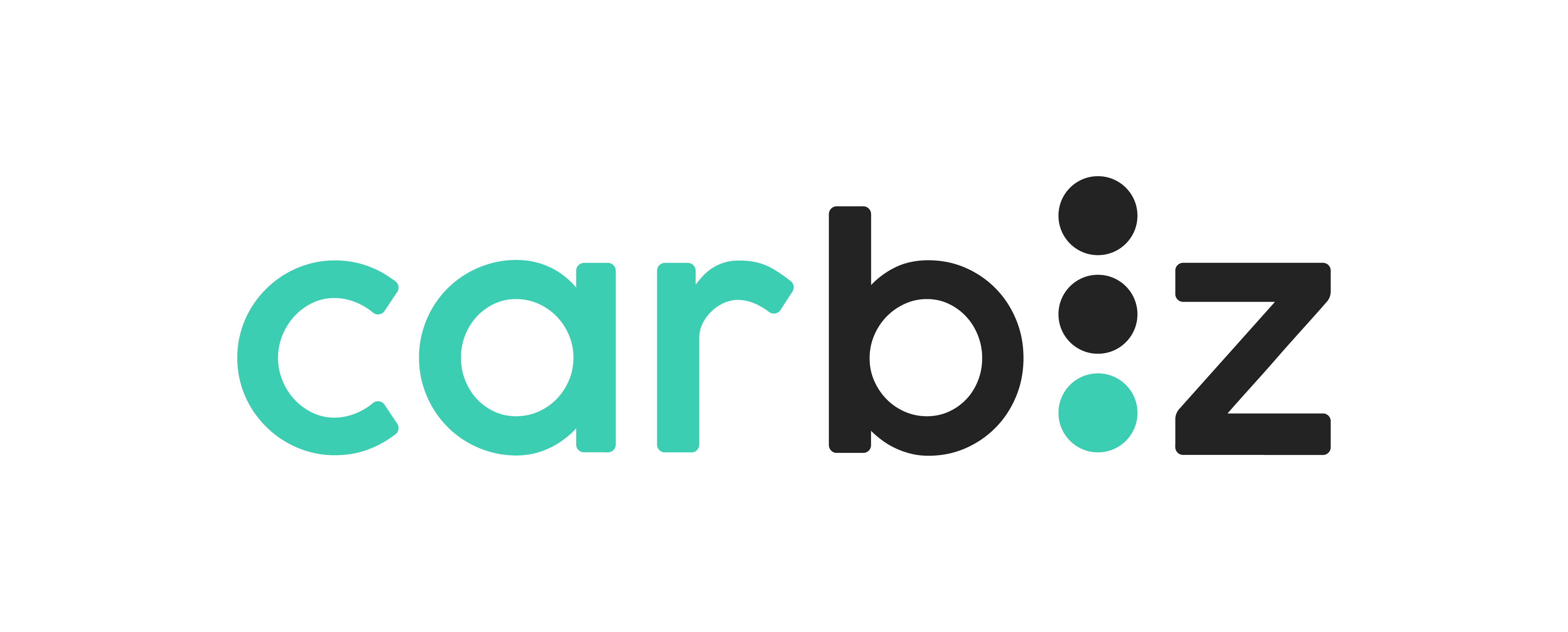
Company size: 101–500 employees
All permanent employees have access to a Study Assist program, which provides financial assistance as well as potentially time off to complete further studies aligned with their career goals.
The aim is so the replacement vehicle provider can promote from within and it offers employees greater opportunities, particularly as the young and growing company is able to effectively transition staff either horizontally or vertically into roles aligned with their career goals or area of study.


Living proof of the scheme’s success is Monique Vella, who is part of the HR team.
“Through Carbiz’s Study Assist program, I’ve been able to further my education while transitioning from a customer service executive to an HR assistant,” she explains. “This support has allowed me to develop key HR skills in a hands-on environment, applying my studies directly to my role. Carbiz’s commitment to internal growth has given me the opportunity to expand my career and gain valuable experience in HR.”
To date, 21% of existing employees have been promoted (either vertically or horizontally) since joining Carbiz, with 58% of the current management team having been promoted from within, offering a clear example of how the company develops employees and remains true to its purpose and values.
TPG Telecom (NSW, Australia) 
Company size: More than 500 employees
At the firm’s Barangaroo office, in the past year, the first-ever Accessibility Hackathon was held in partnership with charity partner Guide Dogs Australia.
The day was aimed at identifying key accessibility challenges people with low vision or blindness face as they interact with TPG Telecom’s brands, spaces, products and services, and devising targeted, sustainable plans to address them.
Over 40 people across seven teams took part, with Guide Dogs Australia representatives and clients with lived experience working to provide advice on the proposed solutions throughout the day.
SEEK (VIC, Australia) 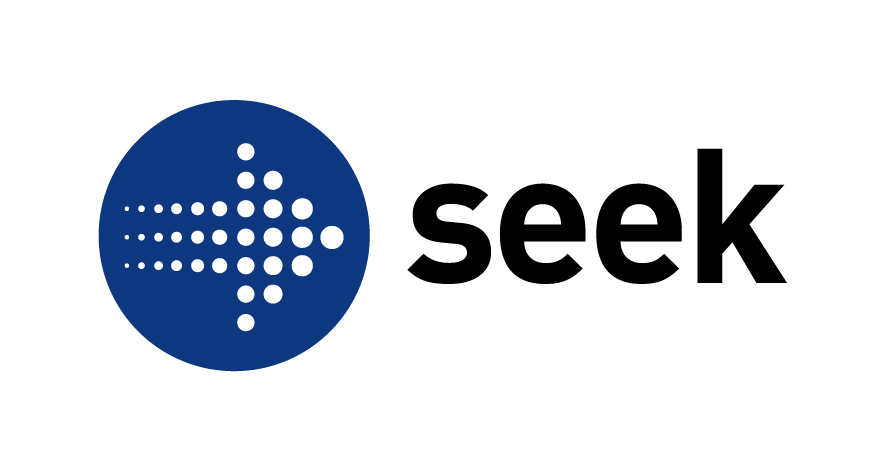
Company size: More than 500 employees
The employment marketplace fosters inclusivity at its HQ with a pair of repurposed rooms, both piloted for six months.
Quiet working space (low sensory) room, used 429 times, averaging three daily users
Prayer room, used 253 times, averaging two daily users
The wellbeing room was frequently booked for ‘drop-in’ conversations and was valuable for critical incident responses. Employee feedback was positive and the rooms remain available for use.
Kathleen McCudden, general executive, people and culture, says, “These spaces have been created to recognise the differing needs of our people at SEEK and demonstrate our commitment to being an inclusive place to work.”
The entry process for HRD Australia and New Zealand’s 2025 5-Star Employers of Choice comprised two steps: an employer submission followed by an employee survey. First, organisations had to complete an in-depth submission to explain their various offerings and practices. Next, employees from nominated organisations were asked to fill out an anonymous form evaluating their workplace on a number of metrics including benefits, compensation, culture, employee development, and commitment to diversity and inclusion.
To be considered, each organisation had to reach a minimum number of employee responses based on overall size. Organisations that achieved a 75% or greater average satisfaction rating from employees were named 5-Star Employers of Choice for 2025.